初中英语手写笔记大全.pdf
- 格式:pdf
- 大小:34.31 MB
- 文档页数:36

英语九年级七单元手写笔记以下是英语九年级第七单元的手写笔记:1. 重点词汇electronic:形容词,表示“电子的”。
device:名词,表示“装置;设备”。
technology:名词,表示“技术;工艺”。
application:名词,表示“应用;用途;申请”。
simple:形容词,表示“简单的;易懂的”。
2. 重点短语be able to do sth:表示有能力做某事。
in the future:表示在将来。
be used for:表示被用来做某事。
instead of:表示代替;而不是。
3. 重点句型What will the future be like?(未来会是什么样子?)There will be more robots in the future.(未来会有更多的机器人。
)We will use robots to do dangerous work.(我们将使用机器人做危险的工作。
)4. 重点语法一般将来时态的用法:表示将来要发生的事情或存在的状态。
常用的结构有“will + 动词原形”和“be going to + 动词原形”。
5. 课后练习选择题:考查学生对本单元词汇和语法的掌握情况。
填空题:考查学生对本单元重点句型的运用能力。
阅读理解:通过阅读文章,让学生了解未来科技的发展趋势,培养学生的阅读能力和思维品质。
6. 归纳总结本单元主要介绍了未来科技的发展趋势和机器人技术的应用,让学生了解未来的世界将会变得更加智能化和自动化。
同时,本单元还涉及了一般将来时态的用法和相关词汇和短语的用法,需要学生认真掌握和运用。
希望这些手写笔记能够帮助你更好地学习英语第九年级第七单元的内容。
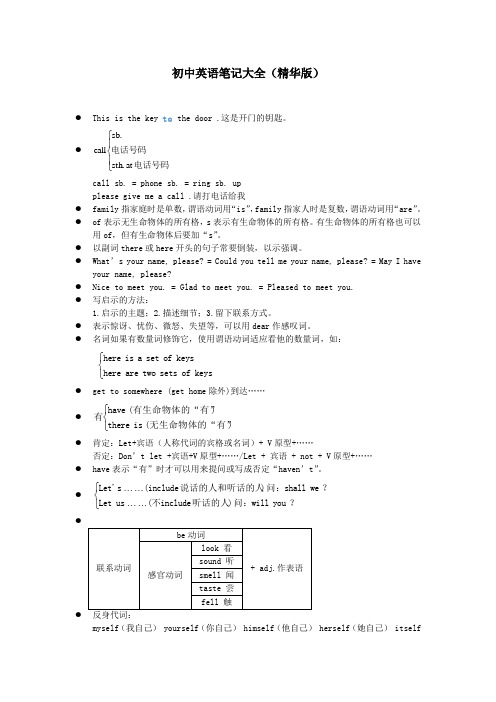
初中英语笔记大全(精华版)● This is the key to the door .这是开门的钥匙。
● ⎪⎩⎪⎨⎧电话号码电话号码at .sth .sb call call sb. = phone sb. = ring sb. upplease give me a call .请打电话给我● family 指家庭时是单数,谓语动词用“is ”,family 指家人时是复数,谓语动词用“are ”。
● of 表示无生命物体的所有格,s 表示有生命物体的所有格。
有生命物体的所有格也可以用of ,但有生命物体后要加“s ”。
● 以副词there 或here 开头的句子常要倒装,以示强调。
● What’s your name, please? = Could you tell me your name, please? = May I have your name, please?● Nice to meet you. = Glad to meet you. = Pleased to meet you.● 写启示的方法:1.启示的主题;2.描述细节;3.留下联系方式。
● 表示惊讶、忧伤、微怒、失望等,可以用dear 作感叹词。
● 名词如果有数量词修饰它,使用谓语动词适应看他的数量词,如:⎩⎨⎧ keys of sets two are here keysof set a is here● get to somewhere (get home 除外)到达……● ⎩⎨⎧)无生命物体的“有”( is there )有生命物体的“有”( have 有 ● 肯定:Let+宾语(人称代词的宾格或名词)+ V 原型+……否定:Don’t let +宾语+V 原型+……/Let + 宾语 + not + V 原型+……● have 表示“有”时才可以用来提问或写成否定“haven’t”。
● ⎩⎨⎧⋯⋯⋯⋯? you will 问: )听话的人include 不(us Let ? we shall 问: )说话的人和听话的人(include s Let' ●● myself (我自己) yourself (你自己) himself (他自己) herself (她自己) itself(它自己) ourselves(我们自己) yourselves(你们自己) themselves(他们自己)●How much + be + 商品?(答:It’s/They’re……) = What is the price of……?(答:It ’s……)●cent 美分 One dollar =100 cents●other(两者中的另一个) another(三者中的另一个)●越接近物品本身性质的形容词越靠近物品,如:big blue hat●帮助某人做某事help sb. (to) do sth.help sb. with sth.with the help (n.) of sb. e.g. He studies math well, with the help of teacher.●一般将来时的一般形式:主语+will+动词原形+……●Can I help you? = What can I do for you? = (Is there) anything I can do for you? ●●●“hundred,thousand”与基数词一起表示具体数字时不加“s”。
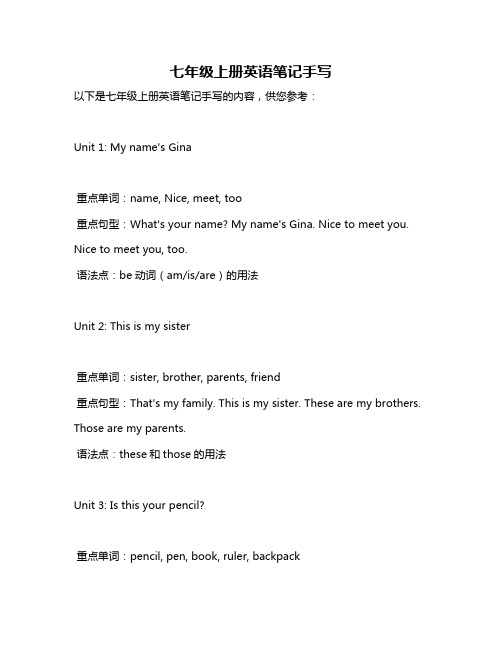
七年级上册英语笔记手写以下是七年级上册英语笔记手写的内容,供您参考:Unit 1: My name's Gina重点单词:name, Nice, meet, too重点句型:What's your name? My name's Gina. Nice to meet you. Nice to meet you, too.语法点:be动词(am/is/are)的用法Unit 2: This is my sister重点单词:sister, brother, parents, friend重点句型:That's my family. This is my sister. These are my brothers. Those are my parents.语法点:these和those的用法Unit 3: Is this your pencil?重点单词:pencil, pen, book, ruler, backpack重点句型:Is this your pencil? Yes, it is. No, it isn't. Are these your books? Yes, they are. No, they aren't.语法点:一般疑问句及其回答Unit 4: Where's my backpack?重点单词:on, in, under, beside, between重点句型:Where's my backpack? It's on the floor. Are the keys in the drawer? Yes, they are. No, they aren't.语法点:介词的用法(on,in,under,beside,between等)Unit 5: Do you have a soccer ball?重点单词:soccer,ball,ping-pong,volleyball,basketball,let,us 重点句型:Do you have a soccer ball? Yes,I do. No,I don't. Does she have a ping-pong bat? Yes,she does. No,she doesn't.语法点:行为动词的一般现在时(第三人称单数形式)及其否定形式。
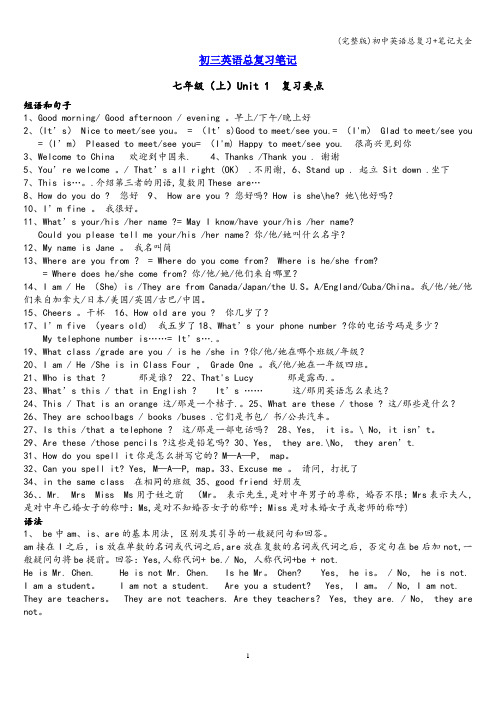
初三英语总复习笔记七年级(上)Unit 1 复习要点短语和句子1、Good morning/ Good afternoon / evening 。
早上/下午/晚上好2、(It’s) Nice to meet/see you。
= (It’s)Good to meet/see you.= (I'm) Glad to meet/see you= (I’m) Pleased to meet/see you= (I'm) Happy to meet/see you. 很高兴见到你3、Welcome to China 欢迎到中国来.4、Thanks /Thank you . 谢谢5、You’re welcome 。
/ That’s all right (OK) .不用谢,6、Stand up . 起立 Sit down .坐下7、This is…。
.介绍第三者的用语,复数用These are…8、How do you do ? 您好 9、 How are you ? 您好吗? How is she\he? 她\他好吗?10、I’m fine 。
我很好。
11、What’s your/his /her name ?= May I know/have your/his /her name?Could you please tell me your/his /her name?你/他/她叫什么名字?12、My name is Jane 。
我名叫简13、Where are you from ? = Where do you come from? Where is he/she from?= Where does he/she come from?你/他/她/他们来自哪里?14、I am / He (She) is /They are from Canada/Japan/the U.S。
A/England/Cuba/China。
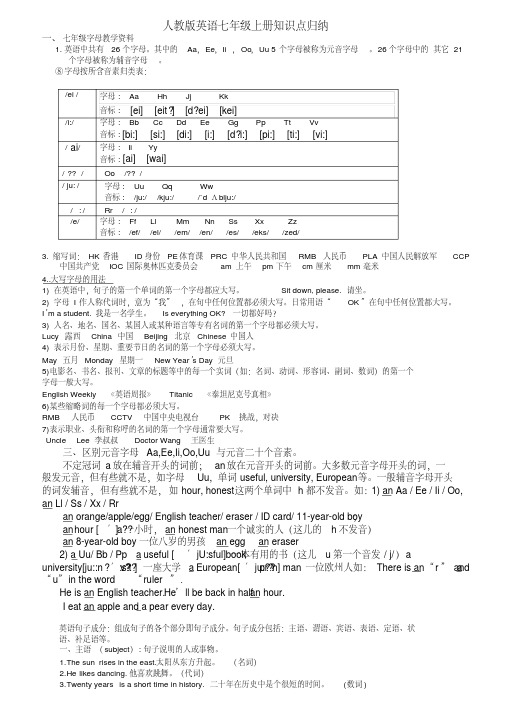
人教版英语七年级上册知识点归纳一、七年级字母教学资料1.英语中共有26个字母。
其中的Aa,Ee,Ii,Oo,Uu 5个字母被称为元音字母。
26个字母中的其它21个字母被称为辅音字母。
⑧字母按所含音素归类表:/ei / 字母: Aa Hh Jj Kk音标:[ei] [eit?] [d?ei] [kei]/i:/ 字母: Bb Cc Dd Ee Gg Pp Tt Vv音标: [bi:] [si:] [di:] [i:] [d?i:] [pi:] [ti:] [vi:]/ ai/字母: Ii Yy音标: [ai] [wai]/?? / Oo /?? // ju: / 字母: Uu Qq Ww音标: /ju:/ /kju:/ /`dΛblju://ɑ: / Rr /ɑ: //e/ 字母: Ff Ll Mm Nn Ss Xx Zz音标: /ef/ /el/ /em/ /en/ /es/ /eks/ /zed/3.缩写词:HK香港ID身份PE体育课PRC 中华人民共和国RMB 人民币PLA中国人民解放军CCP中国共产党IOC国际奥林匹克委员会am 上午pm下午cm厘米mm毫米4..大写字母的用法1) 在英语中,句子的第一个单词的第一个字母都应大写。
Sit down, please. 请坐。
2) 字母I作人称代词时,意为“我”,在句中任何位置都必须大写。
日常用语“OK”在句中任何位置都大写。
I’m a student. 我是一名学生。
Is everything OK? 一切都好吗?3) 人名、地名、国名、某国人或某种语言等专有名词的第一个字母都必须大写。
Lucy 露西China 中国Beijing 北京Chinese 中国人4) 表示月份、星期、重要节日的名词的第一个字母必须大写。
May 五月Monday 星期一New Year’s Day 元旦5)电影名、书名、报刊、文章的标题等中的每一个实词(如:名词、动词、形容词、副词、数词)的第一个字母一般大写。
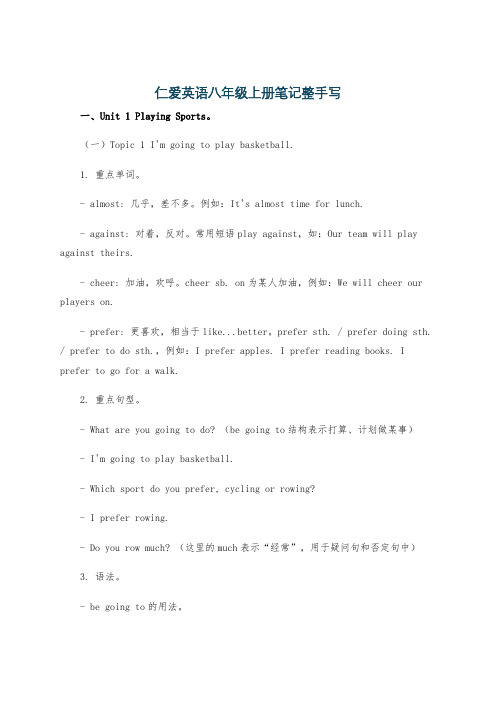
仁爱英语八年级上册笔记整手写一、Unit 1 Playing Sports。
(一)Topic 1 I'm going to play basketball.1. 重点单词。
- almost: 几乎,差不多。
例如:It's almost time for lunch.- against: 对着,反对。
常用短语play against,如:Our team will play against theirs.- cheer: 加油,欢呼。
cheer sb. on为某人加油,例如:We will cheer our players on.- prefer: 更喜欢,相当于like...better。
prefer sth. / prefer doing sth. / prefer to do sth.,例如:I prefer apples. I prefer reading books. I prefer to go for a walk.2. 重点句型。
- What are you going to do? (be going to结构表示打算、计划做某事)- I'm going to play basketball.- Which sport do you prefer, cycling or rowing?- I prefer rowing.- Do you row much? (这里的much表示“经常”,用于疑问句和否定句中)3. 语法。
- be going to的用法。
- 构成:be(am/is/are)+ going to+动词原形。
- 用法:表示主观打算做某事或根据某种迹象表明即将发生某事。
例如:Look at the clouds. It's going to rain.(根据乌云这一迹象判断即将下雨)(二)Topic 2 Would you mind teaching me?1. 重点单词。
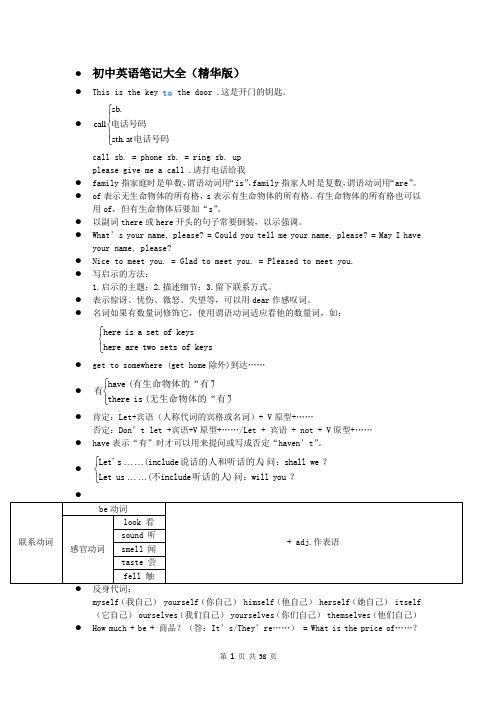
●初中英语笔记大全(精华版)● This is the key to the door .这是开门的钥匙。
●⎪⎩⎪⎨⎧电话号码电话号码at .sth .sb call call sb. = phone sb. = ring sb. up please give me a call .请打电话给我 ● family 指家庭时是单数,谓语动词用“is ”,family 指家人时是复数,谓语动词用“are ”。
● of 表示无生命物体的所有格,s 表示有生命物体的所有格。
有生命物体的所有格也可以用of ,但有生命物体后要加“s ”。
● 以副词there 或here 开头的句子常要倒装,以示强调。
● What’s your name, please? = Could you tell me your name, please? = May I have your name, please?● Nice to meet you. = Glad to meet you. = Pleased to meet you. ● 写启示的方法:1.启示的主题;2.描述细节;3.留下联系方式。
● 表示惊讶、忧伤、微怒、失望等,可以用dear 作感叹词。
●名词如果有数量词修饰它,使用谓语动词适应看他的数量词,如:⎩⎨⎧keys of sets two are here keys of set a is here ● get to somewhere (get home 除外)到达…… ●⎩⎨⎧)无生命物体的“有”(is there )有生命物体的“有”( have 有 ● 肯定:Let+宾语(人称代词的宾格或名词)+ V 原型+……否定:Don’t let +宾语+V 原型+……/Let + 宾语 + not + V 原型+…… ● have 表示“有”时才可以用来提问或写成否定“haven’t”。
●⎩⎨⎧⋯⋯⋯⋯? you will 问: )听话的人include 不(us Let ?we shall 问: )说话的人和听话的人(include s Let'myself (我自己) yourself (你自己) himself (他自己) herself (她自己) itself (它自己) ourselves (我们自己) yourselves (你们自己) themselves (他们自己) ● How much + be + 商品?(答:It’s/They’re……) = What is the price of ……?(答:It ’s……)●cent 美分 One dollar =100 cents●other(两者中的另一个) another(三者中的另一个)●越接近物品本身性质的形容词越靠近物品,如:big blue hat●帮助某人做某事help sb. (to) do sth.help sb. with sth.with the help (n.) of sb. e.g. He studies math well, with the help of teacher.●一般将来时的一般形式:主语+will+动词原形+……●Can I help you? = What can I do for you? = (Is there) anything I can do for you? ●●●“hundred,thousand”与基数词一起表示具体数字时不加“s”。

七上英语2024新版教材笔记人教版七年级上册英语2024新版教材笔记。
一、预备篇。
1. 字母。
- 26个英文字母的大小写书写规范。
大写字母占上两格,如A、B、C等;小写字母有的占一格(如a、c、e等),有的占两格(如b、d、h等),还有的占三格(如f、j等)。
- 字母的读音,注意元音字母(a、e、i、o、u)和辅音字母的发音区别。
例如,元音字母在开音节和闭音节中的发音不同。
2. 简单的问候语和自我介绍。
- Hello/Hi:用于熟人或陌生人之间的简单问候,比较随意。
- Good morning/afternoon/evening:根据不同的时间段使用,分别是早上、下午、晚上的问候语,较为正式。
- 自我介绍:“I'm...”(I am的缩写形式),后面接自己的名字,例如“I'm Tom.”二、Unit 1 My name's Gina.1. 重点单词。
- name:名字,可用于询问他人名字,如“What's your name?”- to:在这里是不定式符号,在“Nice to meet you.”中无实际意义。
- meet:遇见,相逢。
- too:也,用于句末,如“I'm fine, too.”- your:你的,你们的,是形容词性物主代词,后面要接名词,如“your name”。
- his:他的;her:她的,这两个也是形容词性物主代词。
2. 重点句型。
- What's your name?- 回答:“My name's...”或者“I'm...”。
- Nice to meet you.- 回答:“Nice to meet you, too.”- Is he/she...?- 回答:“Yes, he/she is.”或者“No, he/she isn't.”例如“Is he Tom? Yes, he is.”三、Unit 2 This is my sister.1. 重点单词。
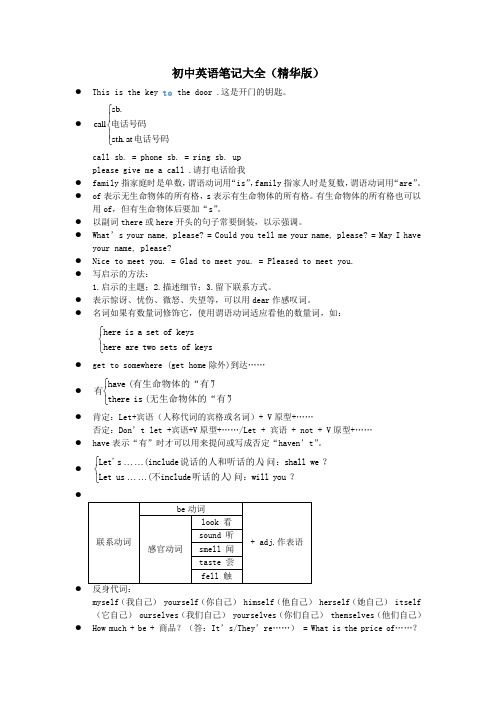
初中英语笔记大全(精华版)● This is the key to the door .这是开门的钥匙。
● ⎪⎩⎪⎨⎧电话号码电话号码at .sth .sb call call sb. = phone sb. = ring sb. upplease give me a call .请打电话给我● family 指家庭时是单数,谓语动词用“is ”,family 指家人时是复数,谓语动词用“are ”。
● of 表示无生命物体的所有格,s 表示有生命物体的所有格。
有生命物体的所有格也可以用of ,但有生命物体后要加“s ”。
● 以副词there 或here 开头的句子常要倒装,以示强调。
● What’s your name, please? = Could you tell me your name, please? = May I have your name, please?● Nice to meet you. = Glad to meet you. = Pleased to meet you.● 写启示的方法:1.启示的主题;2.描述细节;3.留下联系方式。
● 表示惊讶、忧伤、微怒、失望等,可以用dear 作感叹词。
● 名词如果有数量词修饰它,使用谓语动词适应看他的数量词,如:⎩⎨⎧ keys of sets two are here keysof set a is here● get to somewhere (get home 除外)到达……● ⎩⎨⎧)无生命物体的“有”(is there )有生命物体的“有”( have 有 ● 肯定:Let+宾语(人称代词的宾格或名词)+ V 原型+……否定:Don’t let +宾语+V 原型+……/Let + 宾语 + not + V 原型+……● have 表示“有”时才可以用来提问或写成否定“haven’t”。
● ⎩⎨⎧⋯⋯⋯⋯? you will 问: )听话的人include 不(us Let ? we shall 问: )说话的人和听话的人(include s Let' ●● myself (我自己) yourself (你自己) himself (他自己) herself (她自己) itself (它自己) ourselves (我们自己) yourselves (你们自己) themselves (他们自己) ● How much + be + 商品?(答:It’s/They’re……) = What is the price of ……?(答:It ’s……)●cent 美分 One dollar =100 cents●other(两者中的另一个) another(三者中的另一个)●越接近物品本身性质的形容词越靠近物品,如:big blue hat●帮助某人做某事help sb. (to) do sth.help sb. with sth.with the help (n.) of sb. e.g. He studies math well, with the help of teacher.●一般将来时的一般形式:主语+will+动词原形+……●Can I help you? = What can I do for you? = (Is there) anything I can do for you? ●●●“hundred,thousand”与基数词一起表示具体数字时不加“s”。

初中英语笔记大全(精华版)● This is the key to the door .这是开门的钥匙。
● ⎪⎩⎪⎨⎧电话号码电话号码at .sth .sb call call sb. = phone sb. = ring sb. upplease give me a call .请打电话给我● family 指家庭时是单数,谓语动词用“is ”,family 指家人时是复数,谓语动词用“are ”。
● of 表示无生命物体的所有格,s 表示有生命物体的所有格。
有生命物体的所有格也可以用of ,但有生命物体后要加“s ”。
● 以副词there 或here 开头的句子常要倒装,以示强调。
● What’s your name, please? = Could you tell me your name, please? = May I have your name, please? ● Nice to meet you. = Glad to meet you. = Pleased to meet you.● 写启示的方法:1.启示的主题;2.描述细节;3.留下联系方式。
● 表示惊讶、忧伤、微怒、失望等,可以用dear 作感叹词。
● 名词如果有数量词修饰它,使用谓语动词适应看他的数量词,如:⎩⎨⎧ keys of sets two are here keysof set a is here● get to somewhere (get home 除外)到达……● ⎩⎨⎧)无生命物体的“有”(is there )有生命物体的“有”( have 有 ● 肯定:Let+宾语(人称代词的宾格或名词)+ V 原型+……否定:Don’t let +宾语+V 原型+……/Let + 宾语 + not + V 原型+……● have 表示“有”时才可以用来提问或写成否定“haven’t”。
● ⎩⎨⎧⋯⋯⋯⋯? you will 问: )听话的人include 不(us Let ? we shall 问: )说话的人和听话的人(include s Let'myself (我自己) yourself (你自己) himself (他自己) herself (她自己) itself (它自己) ourselves (我们自己) yourselves (你们自己) themselves (他们自己)● How much + be + 商品?(答:It’s/They’re……) = What is the price of ……?(答:It ’s ……) ● cent 美分 One dollar =100 cents● other(两者中的另一个) another (三者中的另一个)● 越接近物品本身性质的形容词越靠近物品,如:big blue hat●帮助某人做某事help sb. (to) do sth.help sb. with sth.with the help (n.) of sb. e.g. He studies math well, with the help of teacher.●一般将来时的一般形式:主语+will+动词原形+……●Can I help you? = What can I do for you? = (Is there) anything I can do for you?●“hundred,thousand”与基数词一起表示具体数字时不加“s”。
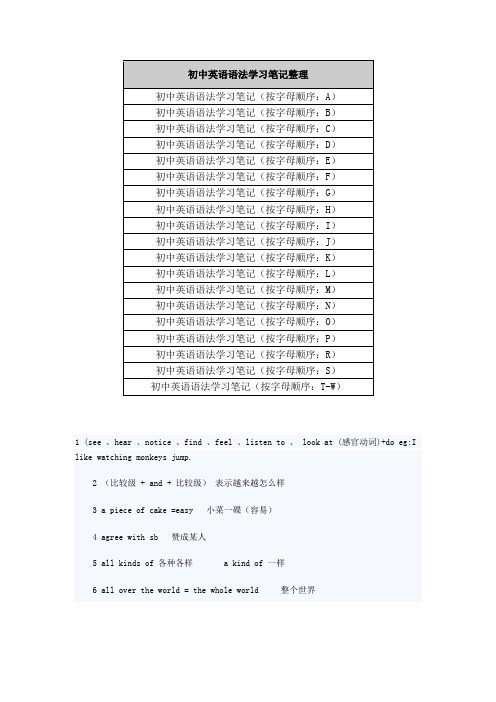
1 (see 、hear 、notice 、find 、feel 、listen to 、 look at (感官动词)+do eg:I like watching monkeys jump.2 (比较级 + and + 比较级)表示越来越怎么样3 a piece of cake =easy 小菜一碟(容易)4 agree with sb 赞成某人5 all kinds of 各种各样 a kind of 一样6 all over the world = the whole world 整个世界7 along with同……一道,伴随…… eg : I will go along with you. 我将和你一起去 the students planted trees along with their teachers. 学生同老师们一起种树8 As soon as 一怎么样就怎么样9 as you can see 你是知道的10 ask for ……求助, 向…要…(直接接想要的东西) eg : ask you for my book11 ask sb for sth 向某人什么12 ask sb to do sth 询问某人某事 ask sb not to do 叫某人不要做某事13 at the age of 在……岁时 eg:I am sixteen I am at the age of sixteen.14 at the beginning of …… ……的起初;……的开始15 at the end of +地点/+时间: 最后,尽头,末尾. eg : At the end of the day16 at this time of year 在每年的这个时候17 be /feel confident of sth /that clause +从句感觉/对什么有信心,自信 eg : I am / feel confident of my spoken English I feel that I can pass the test.18 be + doing :1 现在进行时 2 将来时19 be able to (+ v 原) = can (+ v 原)能够…… eg : She is able to sing She can sing.20 be able to do sth 能够干什么 eg :she is able to sing.21 be afraid to do (of sth 恐惧,害怕…… eg : I'm afraed to go out at nigh t I'm afraid of dog22 be allowed to do 被允许做什么 eg: I'm allowed to watch TV 我被允许看电视I should be allowed to watch TV 我应该被允许看电视23 be angry with sb 生某人的气 eg : Don't be angry with me24 be angry with(at) sb for doing sth 为什么而生某人的气25 be as…原级…as 和什么一样 eg : She is as tall as me 她和我一样高26 be ashamed to27 be away from 远离28 be away from 从……离开29 be bad for 对什么有害 eg : Reading books in the sun is bad for your eyes 在太阳下看书对你的眼睛不好30 be born 出生于31 be busy doing sth 忙于做什么事 be busy with sth 忙于……32 be careful 当心;小心33 be different from…… 和什么不一样34 be famous for 以……著名35 be friendly to sb 对某人友好36 be from = come from 来自 eg :He is from Bejing He comes from Bejing I s he from Bejing ? Does he come from Bejing ?37 be full of 装满……的 be filled with 充满 eg: the glass is full of water the glass is filled with water38 be glad+to+do/从句39 be going to + v(原)将来时40 be good at(+doing) = do well in 在某方面善长, 善于……41 be good for 对什么有好处 eg : Reading aloud is good for your English42 be happy to do 很高兴做某事43 be helpful to sb 对某人有好处 eg : Reading aloud is helpful to you 大声朗读对你有好处 Exercising is helpful to your bady 锻炼对你的身体有好处44 be in good health 身体健康45 be in trouble 处于困难中 eg : She is in trouble They are in tronble46 be interested in 对某方面感兴趣47 be late for = come late to 迟到 eg: Be late for class 上课迟到48 be like 像…… eg : I'm like my mother49 be mad at 生某人的气50 be made from 由……制成 (制成以后看不见原材料)51 be made of 由……制成(制成以后还看得见原材料)52 be not sure 表不确定53 be on a visit to 参观54 be popular with sb 受某人欢迎55 be quiet 安静56 be short for 表**的缩写 eg: 陶 is short for 陶俊杰57 be sick in bed 生病在床58 be sorry to do sth be sorry for sb eg : I am sorry for you59 be sorry to hear that60 be sorry to trouble sb eg : I am sorry to trouble you61 be strict in doing sth 严于做某事 eg : He's strict in obeying noles62 be strict with sb 对某人要求严格 eg: Some students are not strict with t hem selves 这些学生对自己不严格63 be strict with sb in sth 某方面对某人严格64 be supposed to do 被要求干什么65 be sure 表确定66 be sure of doing sth 对做某事有信心 eg: He is sure of winning I am sure of learning English well67 be sure of sth 对做某事有信心 eg: I'm sure of my head (my teacher 我相信我的大脑(老师)68 be sure that sth 对做某事有信心 eg: I'm suer that he can pass the test 我相信他能通过考试69 be sure to do sth一定会做某事eg: We are sure to pass the test 我们一定会通过这次考试 We are sure to learn English well 我们一定能学好英语70 be terrified of + 名/动doing 害怕……71 be terrified to do sth 害怕做某事72 be the same as … 和什么一样73 be used to doing sth 习惯做某事 eg: My father is used to getting up earl y 我爸爸习惯早He is used to sleeping in class 他习惯上课睡觉74 be worth doing 值得做什么75 be(feel) afraid to do sth 害怕做某事be afraid of sth 害怕某物be afraid that 从句76 because+句子 because of +短语 eg : He was late because he had a headache He was late because of his headache77 begin to do = start to do 开始做某事start…with…=begin…with… 以什么开始什么 eg : Let's begin the game with the song I begin to go home78 between…and… 两者之间79 borrow sth from sb 向……借…… lend sth to sb ( lend sb sth 借给……什么东西 eg : I borrowed a pen from him he lent a pen to me ( he lent me a pen80 both = the same(as) = not different(from) 表相同81 bother 打扰 bother sb to do sth eg : I'm sorry to bother you ,but can yo u tell me to way to the station 我十分道歉打扰你,但是你能告诉我怎么去车站 the problem has been bothering me for weeks 这个问题困扰了我几个周了 He's bothering me to lend him money82 by the end of 到……为止83 call sb sth eg : We call him old wang84 care 关心 eg : Don't you care about this country's future ?你为什么不关心国家的未来85 catch up with sb 赶上某人86 chat with sb 和某人闲谈 take sb to + 地点带某人去某地87 come in 进88 come over to 过来89 come up with 提出 eg: Can you come up with a good idea 你能想出一个好办法吗?90 communicate with sb 和某人交流91 consider + doing 考虑做什么 eg : Why not consider going to lu zhou 为什么不考虑去泸州?92 dance to 随着……跳舞 eg : She likes dancing to the music 她喜欢随着音乐跳舞93 decide to do sth 决定做某事94 do a survey of 做某方面的调查95 do better in 在……方面做得更好96 do wrong 做错97 Don't forget to do sth 不要忘了做某事98 Don't mind +doing /从句 /名词不要介意……99 each +名(单)每一个…eg : Each student has many books 每一个学生都有一些书100 end up +doing 以……结束101 enjoy +doing喜欢102 escape from 从……逃跑eg: The prisoners have escaped from the prison犯人从监狱里逃跑出来103 expect to do sth 期待做某事104 fall down 摔下来 fall off 从哪摔下来105 fall in love with sb /sth 爱上什么106 far from 离某地远 eg : The school is far from my home107 find +it +adj +to do 发现做某事怎么样108 find sb/sth +adj 发现什么怎么样 eg : I find the book interesting109 finish 完成+doing(名词)110 fit to sb = be fit for sb 适合某人111 forget to do 没有做而忘了 forget doing 做了而又忘了 eg: Don't forget to go home I forget closing door112 from…to… 从某某到某某 eg: From me to her113 get /have sth down 做完,被(别人)做…eg: I hav e my hair cut 我理了发(头发被剪了) Tom got his bad tooth pulled out 汤母把他的坏牙拔掉了(被牙医拔掉了)114 get a part-time job= find a part-time job115 get along well with sb = get on well with sb 与某人相处得好116 get along with sb = get on with sb 与某人相处117 get ready for = be ready for为什么而准备eg : I get ready for math I am ready for math118 get sb in to trouble 给某人麻119 get sb to do sth120 get…from… 从某处得到某物121 give a talk 做报告 eg: He is give a tall122 give sth to sb give sb sth 给某人某物123 go fish 钓鱼 go swimming 游泳124 go on to do 去做下一件事 go on doing 继续做这件事125 go out away from go out of126 go to school 上学(用于专业的)go to the school 去学校(不一定是上学)127 good way to 好方法128 hate to do 讨厌没做过的事 hate doing 讨厌做过的事129 have a party for sb 举办谁的晚会130 have a talk 听报告谈一谈131 have been doing 现在完成进行时 eg : You have been talking You have been sleeping since132 have been to …( 地方)……去过某过地方have gone to …(地方)去了某地还没回来133 have fun +doing 玩得高兴134 have sth to do 有什么事要做 eg: I have a lot of homework to do 我有很多家庭作业要做 I have nothing to do 我没什么事情做135 have to do sth 必须做某事136 have trouble (problem) (in) doing sth 做什么事情有麻烦137 have…time +doing138 have…(时间)…off 放……假 eg: I have month off 我请一个月得假139 hear sb +do/doing 听见某人做某事/正在做某事140 help a lot 很大用处141 help sb with sth \one's sth 帮助某人某事(某方面) help sb (to) do sth 帮助某人做某事142 hope to do sth 希望做某事143 How about(+doing) = What about(+doing)144 how do you like = what do you think of 你对什么的看法145 if : 是否=wether eg: I don't know if (wether) I should go to the p arty 我不知道我是否应该去参加晚会 He don't know if (wether) we will arrive on t ime tomorrow morning 他不知道我们明天早上是否能准时到达146 if :如果,假如(全部接一般时态)+条件语态从句 eg: I'll go to LuZ hou if it does't rain 假如明天不下雨,我就去泸州 If they change the plan they w ill let me know 假如他们要改变计划,他们会让我知道的 I'll go to England ,if I h ave enough money next year 如果我明年由足够的钱,我就要去英国147 in one's opinion = sb think 某人认为148 in some ways 在某些方面149 in the end = finally(adv) 最后150 in the north of… 什么在什么的北方(north 北 sowth 南 west 西 east 东)151 in the sun 在太阳下152 increase 增加 eg : They've increased the prece of petrol by 3% 他们把石油价增加了3%153 instead of +(名)代替 eg: I'd like an apple instead of a pear 我想要苹果,而不要梨子 I like English instead of math 我喜欢英语而不喜欢数学154 introduce sb to sb 介绍某人给某人 introduce oneself 自我介绍155 invite sb to do sth 邀请某人做某事156 It takes sb sometime to do sth 做某人花掉某人多少时间 eg : It took me 5 minutes to do my homework It takes me half an hour to cook157 It's +adj +for sb to do sth 对某人来说做某事怎么样158 It's +adj +to do 做某事怎么样159 It's +adj for sb 对于某人来说怎么样 It's +adj of sb 对某人来说太怎么样160 It's +adj(for sb) to do(对某人来说)做某事怎么样 It's +adj of sb to d o sth 对某人来说做某事太怎么样 eg : It's nice of you to help me with my English161 It's a good idea for sb to do sth 对…… 来说是个好主意162 It's important to sb 对某人来说很重要 eg: It's important to me163 It's time to do sth It's time for sth 到了该去做某事的时间 eg : It's ti me to have class It's time for class 该去上课了164 join = take part in 参加165 just now 刚才166 keep +sb /sth +adj /介词短语让什么保持什么样?167 keep out 不让…… 进入168 keep sb adj 让……保持…… eg: I want to keep my mother happy keep heal thy 保持健康169 key to +名词表示:某物的钥匙或某题的答案170 key to… anser to … key 可以是答题或钥匙171 laugh at… 取笑…… eg : Don't langh at others We langhed at the joke172 learn by oneslfe 自学173 learn from sb 向某人学习 eg: We should learn from Lei Feng174 learn to do sth 学做某事175 let sb do sth 让某人做某事176 Let sb down 让某人失望 eg : We shouldn't let our farents down 我们不应该让我们的父母失望177 live from :离某地远178 live in +大地方 /at +小地方居住在某地 eg: I live in LuZhou She lives a t XuanTan179 look after = take care of 照顾照看180 lose one's way 谁迷路 eg : Lose your way 你迷路181 make a decision to do sth 决定做某事182 make friends with sb 和谁成为朋友 eg : I want to make friends with you183 make it early 把时间定的早一点 184 make on exhibition of oneself 让某人出洋相185 make sb /n +n 使什么成为什么 eg : I made her my step moller I made you my wife186 make sb /sth +adj 使某人(某物)怎么样 eg : You must made your bed clea n187 make sb /sth adj 使某人/某物怎么样188 make sb do sth 让某人做某事 eg : I made him write 我以前让他写189 make up be made up of (被动语态)由……组成190 make…difference to…191 mind sb to do mind one's doing 介意……做什么192 most +名 most of +代193 much too +形容词194 must be 一定195 need +名词需要……196 need sb do sth 需要某人做某事197 need to do (实义动词) need do (情态动词)199 no +名词200 not anymore = no more 再也不…… eg: He didn't cry any more / He cried no more 他再也不哭201 not… (形、副)at all eg: He's not tall at all. She doesn't ju np far at all202 not…at all 一点都不203 not…either 表否定,也不 eg : I don't japanse either. I don't have sister, either 我也没有姐姐204 not…until 直到……才…… eg: I didn't sleep until my mother came back . The child didn't stop crying until I give her sugar205 offer / provide sb with sth 给某人提供206 offer sb sth / offer sth to sb 提供什么东西给某人 eg : I offer you wate r / I offer water to you 我给你提供水207 on one's way to…在去……的路上208 on the one hand 一方面 on the other hand 另一方面209 on the phone = over the phone 用电话交谈210 on time 准时 in time 及时211 one day =some day =someday 一天,将来有一天212 one of +可数名词的复数形式213 one to another 一个到另一个214 over and over again 一遍又一遍的 eg : He cleaned the floor over a nd over again215 part-time job 兼职工作 full-time job 全职工作216 pay for…付……钱 pay the bill 开钱,付钱217 please +do218 please help yourself 请随意219 be pleased with sb 对某人感到满意220 pour into 川流不息的涌入,源源而来221 practice +doing 练习做某事222 prefer sth to sth 相对……更喜欢……eg : I prefer physics to chemisty. 在物理和化学中,我更喜欢物理 pre fer doing to sth 更喜欢去做…不愿意去做…eg: He prefers riding a bike to diving .他更喜欢骑自行车,不开小车 pr efer to do sth rather than do sth 宁愿做…也不愿eg: My unde prefers to buy a now car rather than repaiv the used one. 我叔叔更喜欢买新的车,也不去修旧车。
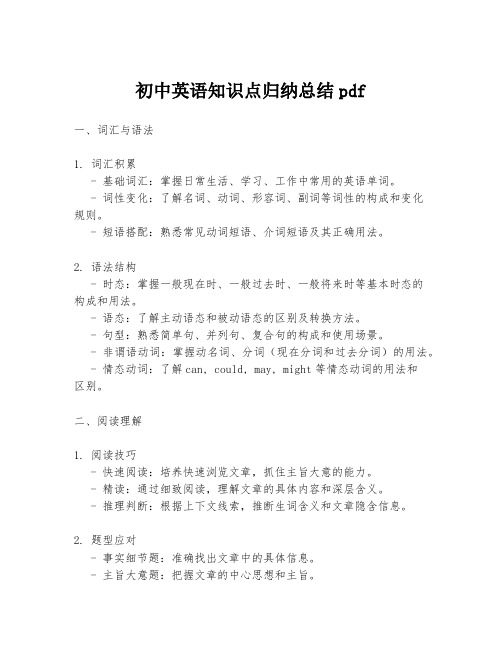
初中英语知识点归纳总结pdf一、词汇与语法1. 词汇积累- 基础词汇:掌握日常生活、学习、工作中常用的英语单词。
- 词性变化:了解名词、动词、形容词、副词等词性的构成和变化规则。
- 短语搭配:熟悉常见动词短语、介词短语及其正确用法。
2. 语法结构- 时态:掌握一般现在时、一般过去时、一般将来时等基本时态的构成和用法。
- 语态:了解主动语态和被动语态的区别及转换方法。
- 句型:熟悉简单句、并列句、复合句的构成和使用场景。
- 非谓语动词:掌握动名词、分词(现在分词和过去分词)的用法。
- 情态动词:了解can, could, may, might等情态动词的用法和区别。
二、阅读理解1. 阅读技巧- 快速阅读:培养快速浏览文章,抓住主旨大意的能力。
- 精读:通过细致阅读,理解文章的具体内容和深层含义。
- 推理判断:根据上下文线索,推断生词含义和文章隐含信息。
2. 题型应对- 事实细节题:准确找出文章中的具体信息。
- 主旨大意题:把握文章的中心思想和主旨。
- 推理判断题:根据文章内容进行逻辑推理,得出结论。
三、写作技巧1. 写作结构- 引入段:开篇引入话题,提出文章主题。
- 正文段:分段论述观点,提供支持细节。
- 结尾段:总结全文,重申主题或提出建议。
2. 写作类型- 记叙文:叙述人物经历、事件发展等。
- 议论文:表达个人观点,提供论据支持。
- 说明文:解释事物特点、原因、过程等。
- 应用文:如书信、日记、通知等实用文体。
四、听力理解1. 听力技巧- 预测内容:根据题目或问题预测对话或短文的内容。
- 注意捕捉:专注于听力材料中的关键信息。
- 记忆回顾:在听力过程中记下重要信息,以便回答问题。
2. 听力题型- 对话题:理解对话双方的主要意思和态度。
- 短文理解:把握短文的主旨和细节信息。
- 听写填空:根据听力材料填写空缺单词或短语。
五、口语表达1. 发音练习- 音标学习:掌握国际音标,正确发音。
- 模仿练习:通过模仿英语母语者的发音和语调来提高口语。

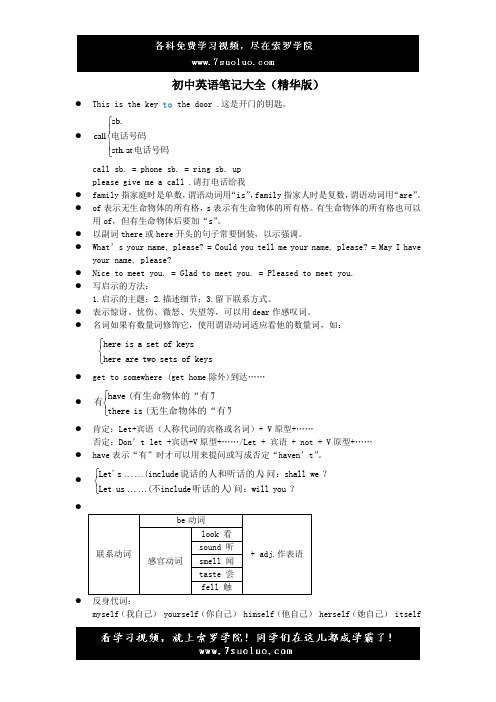
初中英语笔记大全(精华版)● This is the key to the door .这是开门的钥匙。
●⎪⎩⎪⎨⎧电话号码电话号码at .sth .sb call call sb. = phone sb. = ring sb. up please give me a call .请打电话给我 ● family 指家庭时是单数,谓语动词用“is ”,family 指家人时是复数,谓语动词用“are ”。
● of 表示无生命物体的所有格,s 表示有生命物体的所有格。
有生命物体的所有格也可以用of ,但有生命物体后要加“s ”。
● 以副词there 或here 开头的句子常要倒装,以示强调。
● What’s your name, please? = Could you tell me your name, please? = May I have your name, please?● Nice to meet you. = Glad to meet you. = Pleased to meet you. ● 写启示的方法:1.启示的主题;2.描述细节;3.留下联系方式。
● 表示惊讶、忧伤、微怒、失望等,可以用dear 作感叹词。
●名词如果有数量词修饰它,使用谓语动词适应看他的数量词,如:⎩⎨⎧keys of sets two are here keys of set a is here ● get to somewhere (get home 除外)到达…… ●⎩⎨⎧)无生命物体的“有”(is there )有生命物体的“有”( have 有 ● 肯定:Let+宾语(人称代词的宾格或名词)+ V 原型+……否定:Don’t let +宾语+V 原型+……/Let + 宾语 + not + V 原型+…… ● have 表示“有”时才可以用来提问或写成否定“haven’t”。
●⎩⎨⎧⋯⋯⋯⋯? you will 问: )听话的人include 不(us Let ?we shall 问: )说话的人和听话的人(include s Let' ● 联系动词be 动词+ adj.作表语感官动词look 看sound 听smell 闻 taste 尝 fell 触● myself (我自己) yourself (你自己) himself (他自己) herself (她自己) itself(它自己) ourselves(我们自己) yourselves(你们自己) themselves(他们自己)●How much + be + 商品?(答:It’s/They’re……) = What is the price of……?(答:It ’s……)●cent 美分 One dollar =100 cents●other(两者中的另一个) another(三者中的另一个)●越接近物品本身性质的形容词越靠近物品,如:big blue hat●帮助某人做某事help sb. (to) do sth.help sb. with sth.with the help (n.) of sb. e.g. He studies math well, with the help of teacher.●一般将来时的一般形式:主语+will+动词原形+……●Can I help you? = What can I do for you? = (Is there) anything I can do for you? ●●●“hundred,thousand”与基数词一起表示具体数字时不加“s”。

英语知识点手抄笔记pdf嘿,朋友们!咱们今天来聊聊英语知识点手抄笔记 pdf 这个有意思的东西。
你想想,英语这门语言,就像一座神秘的城堡,里面藏着数不清的宝藏——单词、语法、句型,等等。
而我们的手抄笔记 pdf ,那就是打开这座城堡大门的神奇钥匙。
说起单词,那可是英语的基石啊!一个个单词就像是城堡里的小砖块,积累得多了,才能砌成坚固的城墙。
比如“apple”(苹果),多简单的一个词,可你要是不知道,看到苹果的时候,难道要指着说“那个红红圆圆的东西”?这多尴尬呀!语法呢,就像是城堡的建筑结构。
什么主谓宾、定状补,搞清楚了这些,才能让我们说出来的英语句子稳稳当当,不会东倒西歪。
不然,你说一句“I am come from China.” 这不是闹笑话嘛!句型也是很重要的一部分哦!像“How are you?” “Nice to meet you.”这些常用句型,就像是城堡里的通道,能让我们在英语的世界里畅行无阻。
那这手抄笔记 pdf 有啥用呢?它能把这些知识点都有条有理地整理在一起。
比如说,你可以把相似的单词放在一块儿,对比着记忆。
“big”“large”“huge” ,不放在一起比较,你能分得清它们的区别吗?再比如说,把容易混淆的语法点整理出来,标上详细的解释和例句。
每次复习的时候,一目了然,多方便!而且啊,这手抄笔记 pdf 还能随时拿出来看。
在公交车上,排队的时候,哪怕只有几分钟的空闲,都能掏出手机瞄两眼,这不比抱着厚厚的英语书方便多啦?你看,别人在那玩手机游戏,你在这悄悄积累英语知识,等哪天一亮出来,惊艳所有人,多酷呀!总之,英语知识点手抄笔记pdf 可是个宝贝,咱可得好好利用起来,让自己的英语水平像坐火箭一样飙升!。
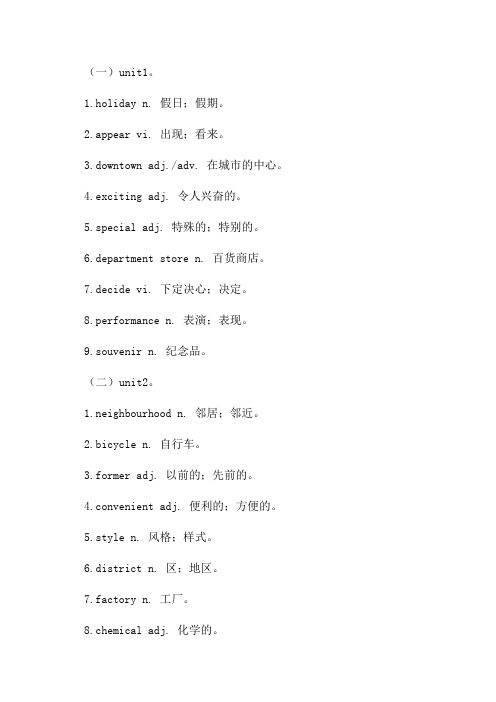
(一)unit1。
1.holiday n. 假日;假期。
2.appear vi. 出现;看来。
3.downtown adj./adv. 在城市的中心。
4.exciting adj. 令人兴奋的。
5.special adj. 特殊的;特别的。
6.department store n. 百货商店。
7.decide vi. 下定决心;决定。
8.performance n. 表演;表现。
9.souvenir n. 纪念品。
(二)unit2。
1.neighbourhood n. 邻居;邻近。
2.bicycle n. 自行车。
3.former adj. 以前的;先前的。
4.convenient adj. 便利的;方便的。
5.style n. 风格;样式。
6.district n. 区;地区。
7.factory n. 工厂。
8.chemical adj. 化学的。
9.pollute vt. 污染。
(三)unit3。
1.library n. 图书馆。
2.loud adj. 大声的。
3.silence n. 沉默;寂静。
4.exchange vt. 交换。
5.bookshop n. 书店。
6.borrow vt. 借;借用。
7.reference n. 参考书。
8.periodical n. 期刊;杂志。
9.period n. 时期;时代。
(四) unit4。
1.diary n. 日记。
2.entry n. 记录;条目。
3.dictionary n. 字典。
4.hobby n. 业余爱好。
6.bored adj. 无聊的;烦闷的。
7.boring adj. 无趣的;令人厌烦的。
8.club n. 俱乐部。
9.photography n. 摄影。
(五)unit5。
1.shower n. 阵雨。
2.temperature n. 温度。
3.humidity n. 湿度。
4.sunshine n. 阳光。
5.typhoon n. 台风。
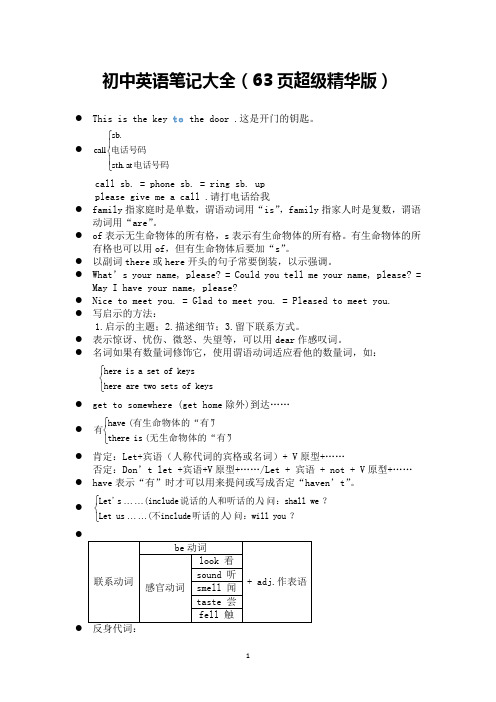
初中英语笔记大全(63页超级精华版)● This is the key to the door .这是开门的钥匙。
● ⎪⎩⎪⎨⎧电话号码电话号码at .sth .sb callcall sb. = phone sb. = ring sb. up please give me a call .请打电话给我 ●family 指家庭时是单数,谓语动词用“is ”,family 指家人时是复数,谓语动词用“are ”。
●of 表示无生命物体的所有格,s 表示有生命物体的所有格。
有生命物体的所有格也可以用of ,但有生命物体后要加“s ”。
●以副词there 或here 开头的句子常要倒装,以示强调。
●What’s your name, please? = Could you tell me your name, please? = May I have your name, please? ●Nice to meet you. = Glad to meet you. = Pleased to meet you. ●写启示的方法: 1.启示的主题;2.描述细节;3.留下联系方式。
●表示惊讶、忧伤、微怒、失望等,可以用dear 作感叹词。
● 名词如果有数量词修饰它,使用谓语动词适应看他的数量词,如: ⎩⎨⎧keys of sets two are here keys of set a is here● get to somewhere (get home 除外)到达……● ⎩⎨⎧)无生命物体的“有”(is there )有生命物体的“有”( have 有 ● 肯定:Let+宾语(人称代词的宾格或名词)+ V 原型+……否定:Don’t let +宾语+V 原型+……/Let + 宾语 + not + V 原型+…… ● have 表示“有”时才可以用来提问或写成否定“haven’t”。
● ⎩⎨⎧⋯⋯⋯⋯? you will 问: )听话的人include 不(us Let ? we shall 问: )说话的人和听话的人(include s Let' ●●myself(我自己) yourself(你自己) himself(他自己) herself(她自己) itself(它自己) ourselves(我们自己) yourselves(你们自己)themselves(他们自己)●How much + be + 商品?(答:It’s/They’re……) = What is the priceof……?(答:It ’s……)●cent 美分 One dollar =100 cents●other(两者中的另一个) another(三者中的另一个)●越接近物品本身性质的形容词越靠近物品,如:big blue hat●帮助某人做某事help sb. (to) do sth.help sb. with sth.with the help (n.) of sb. e.g. He studies math well, with the help of teacher.●一般将来时的一般形式:主语+will+动词原形+……●Can I help you? = What can I do for you? = (Is there) anything I cando for you?●●●“hundred,thousand”与基数词一起表示具体数字时不加“s”。